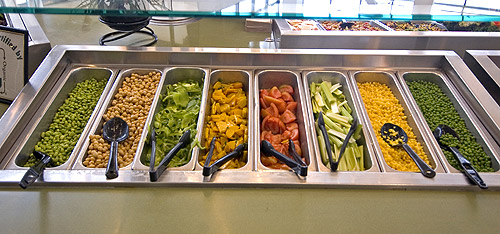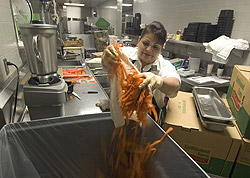Berkeleyan
 Berkeley this week became the first-ever college campus in America to feature a salad bar offering only ingredients prepared in a certified organic kitchen. By next spring, all four of Cal Dining's dining halls will offer their customers that option, extending the trend toward organic in institutional food service. (Steve McConnell photos) |
Care to try a really green salad?
By next spring, all four dining halls managed by Cal Dining will offer certified-organic salad bars
![]()
| 05 April 2006
As of this week, students at the Crossroads dining commons are eating the first-ever salads to be prepared in a certified organic kitchen on an American college campus, according to the country's leading organic-certification organization.
From now on, each of the stainless-steel pans cradled in ice along both arms of Crossroads' lazy-V salad bar will be laden with organic goodies: fresh spinach, carrot and cucumber slices, pasta salads, kidney and garbanzo beans, bacon bits (okay, they're actually soy), sunflower seeds, an array of salad dressings, and all the other fixings a great salad requires. Items that don't meet the organic standards - breads, soups, olives - will be banished to the end of the counter, beyond the banners heralding certification.
"This is huge, and it's certainly the mark of the beginning of a trend in food service toward organic," says Jake Lewin, director of marketing and international programs at California Certified Organic Farmers (CCOF), the Santa Cruz-based organization that issued the landmark organic certification.
"While there are numerous colleges and other institutions that serve some organic food, until now none has made the leap to being certified," he says. "What Cal Dining is doing points the way for other colleges and institutions to go."
Shawn LaPean, director of Cal Dining, says that going organic was a challenge.
 In Crossroads' special organic kitchen, Cal Dining staffer Maria Ventura pitches carrot peels into a bin destined for the compost pile rather than the trash. The scraps become compost, while leftovers are donated to a local homeless shelter. |
"We wanted to incorporate organic products into our program because it's the right thing to do for our community, and our customers were asking for it," he says. "But the student dining committee wouldn't support an action that might increase room-and-board fees." To hold down the higher costs that many organic items command, Cal Dining negotiated with its vendors and struck a deal with a local salad-dressing company owned by a Berkeley alumna.
Chuck Davies, Cal Dining's assistant director and executive chef, spearheaded the drive toward organic.
"At first we thought, 'Okay, we can buy some organic things,'" Davies recalls. "But that just didn't feel like it had enough integrity. There are standards that hold manufacturers and producers to a different level. My feeling was that people who serve the products should be held to standards as well."
Davies is referring to the standards set forth in the National Organic Program, issued by the U.S. Department of Agriculture in 2002. Under the program, any food labeled organic must meet strict requirements. Regulations also apply to retail food establishments that serve organic food.
Most of the federal regulations are designed to maintain "organic integrity" of products from the time they arrive on the loading dock to the moment they are offered for consumption. The rules are so exacting that Davies quickly concluded that if Cal Dining were going to offer a line of organic food, he'd need a separate kitchen. Fortunately, a small stand-alone kitchen already existed in one corner of Crossroads' food-preparation area.
In September 2005, Davies hired Lorraine Aguilar, a senior in Berkeley's Nutritional Science and Toxicology department, to help complete CCOF's extensive application. The two created product flow charts and an audit trail showing from start to finish how organic products would be handled. They made maps of the kitchen and dining areas and outlined how staff would deal with dishwashing and pest control using only approved products. They wrote a manual for staff that includes instructions on how to clean equipment, food-prep stations, and storage areas, and how to keep organic products away from countertops, dishes, knives, or utensils that have come into contact with non-organic products. They devised color-coded labels to identify organic cutting boards, and ordered round, green stickers printed with the word "organic" to be slapped onto every box of organic goods that arrives on the loading dock.
Davies submitted the application in December. After a review, an inspection, and requests for a few revisions, CCOF awarded the official stamp of organic certification to the salad-bar kitchen on March 21.
"Between the training and the paperwork, the fact of the matter is that organic certification for a restaurant or food facility isn't easy," Lewin says. "The bottom line is that Crossroads now has a stringent system for ensuring that there is no commingling of organic products with non-organic products. It's all about making sure the end product really is organic."
Organic certification is just one of Cal Dining's many green business practices. Since it opened in January 2003, Crossroads has been a showcase of green design and management. In 2004 it became the first campus facility certified as a Bay Area Green business by Alameda County officials. Natural lighting and energy-efficient fixtures cut electricity consumption. Low-flow water faucets conserve water. Tables are cleaned with cloth instead of paper. Excess food is donated to a local homeless shelter, and food scraps are picked up by a local company to be turned into garden compost.
CCOF, a nonprofit organization formed by a group of grassroots- activist farmers in 1973, is the oldest and largest organic certifier in North America. It is one of 56 companies in the United States that the U.S. Department of Agriculture has designated as accredited certifying agents for organic products and services.

